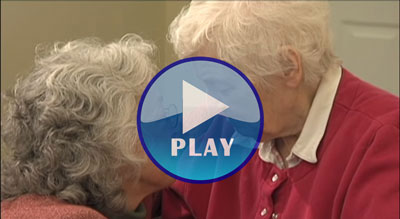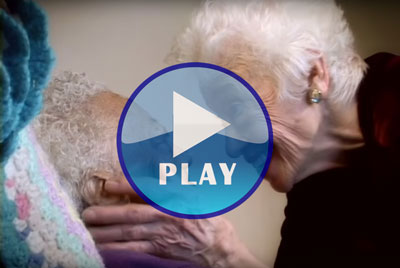Dementia Care Support Services – Validation Theory
When we care for clients diagnosed with a form of dementia Daughterly Care Caregivers have an invisible tool box of different ‘methods of care’ we can draw on to connect with and relate to our private care clients – Validation Theory is one such way of relating to people living with dementia, in our tool kit.
Social Worker Naomi Feil M.S.W., A.C.S.W., the developer of Validation Theory says:
Validation is a method of communicating with and helping disoriented very old people. It is a practical way of working that helps reduce stress, enhance dignity and increase happiness. Validation is built on an empathetic attitude and a holistic view of individuals.
Dementia Australia defines Validation Theory here as:
Validation Theory advocates that, rather than trying to bring the person with dementia back to our reality, it is more positive to enter their reality. In this way empathy is developed with the person, building trust and a sense of security. This in turn reduces anxiety. Many families and carers report increased benefits for themselves, as well as for the person with dementia, from a reduced number of conflicts and a less stressful environment.
An example of how we use Validation Theory with someone who has mid-stage dementia
Our Daughterly Care Caregiver, Sue arrives at the home of a 92 year old lady, Edna, who is upset because she says, her mother has just died and she is getting ready for the funeral.
Sue follows Edna into her bedroom where she is going through her clothes trying to work out what to wear to the funeral.
Sue uses Validation Theory to enable Edna to express her feelings by saying, “you must miss your mother very much”. Edna expresses her feelings of grief for the loss of her mother.
Then Sue says, “it sounds like your mother was a lovely mother and you loved her very much”. Edna talks about what a loving mother she was. Whilst talking they have selected a dress & shoes to wear to the funeral and they lay the dress and the bed.
Sue Segue from Edna’s reality to the present by saying, “we have time to have a cup of tea and lunch… let’s go to the kitchen and make a cup of tea”.
Sue diverts Edna to the present and asks her about a photograph of her daughter and grandson. With time, the funeral is forgotten and when possible, Sue slips back into the bedroom to put the dress and shoes away.
After Edna eats her lunch they go for a walk and admire the flowers in the neighbourhood gardens. Sue sets Edna up with her favourite music playing just before she leaves.
********************
Key points to note:
- Our Caregiver didn’t humiliate 92 year old Edna by correcting or discounting her feelings or her reality, telling her that her mother’s funeral was more than 21 years ago
- Instead, our Caregiver used Valildation Theory to care for Edna in her reality, giving validation to her feelings and encouraging her to talk about her mother
- After an appropriate time, our Caregiver diverted Edna and orientated her back to reality by suggesting there was still plenty of time to have a cup of tea and some lunch, thereby opening up the opportunity to change the setting and focus their conversation on the ‘now’, her daughter and her grandchildren.
- Our Caregiver made sure Edna had lunch and took her medication and a cup of tea (her main goal whilst caring for Edna);
- Our Caregiver took Edna for a walk in the neighbourhood (Exercise Therapy) and upon completion of her visit, left Edna feeling joyful with her favourite music playing.
********************
What’s the Daughterly Care Caregivers advantage?
It takes experience, patience, creativity and emotional intelligence to care for, support and enable people with a form of dementia in a way that validates their current reality and feelings, then diverts them to a more joyful present reality. If you only divert and distract the person, you are not listening to the client and validating their feelings. Our experienced Dementia Caregivers and Live in Carers have the training and experience required to care for people with dementia and that’s the advantage of using Daughterly Care.
Discover how we care for people living with dementia:
We are dementia care specialists
Music and memory for people living with dementia
Dementia Care Music and Memory
Beautiful examples of exceptional in home dementia care:
More about dementia
Naomi Feil, M.S.W., A.C.S.W. has a Masters of Social Work and is the founder of the Validation Training Institute.
Mrs Feil grew up in a nursing home, where her father was the administrator. This is of great importance as it meant from a young age, she spent a lot of time with elders and observed them regularly and at close hand. This gave Naomi Feil an insight into elders in nursing homes and no doubt led her to wanting to help people connect and relate better to them. It has subsequently driven her lifelong, notable development of her Validation Theory. Naomi Feil is a great advocate and, we believe, heroine of older people and their right to be treated with humanity and dignity.
According to Naomi Feil’s website, The Validation Training Institute Inc. and in her words, (please forgive the Amercian spelling and also her use of the term ‘bizarre behaviour’) she says:
“Validation is a method of communicating with and helping disoriented very old people. It is a practical way of working that helps reduce stress, enhance dignity and increase happiness. Validation is built on an empathetic attitude and a holistic view of individuals. When one can “step into the shoes” of another human being and “see through their eyes,” one can step into the world of disoriented very old people and understand the meaning of their sometimes bizarre behavior.
“Validation theory explains that many very old disoriented people, who are often diagnosed as having Alzheimer type dementia, are in the final stage of life, trying to resolve unfinished issues in order to die in peace. Their final struggle is important and we, as caregivers, can help them.
Using Validation techniques we offer disoriented elderly an opportunity to express what they wish to express whether it is verbal or non-verbal communication. Validation practitioners are caring, non-judgemental and open to the feelings that are expressed. When disoriented elderly can express the things that have often been suppressed for many years, the intensity of the feelings lessen, people communicate more and are less likely to withdraw into further stages of disorientation.”
The following 4 minute video of Naomi Feil explaining her Validation Theory is really worth watching.
And the next video, which runs for approx. 5 minutes is of Naomi Feil using Validation Therapy with Gladys Wilson, an 87 year old lady with very advanced dementia, who is deeply withdrawn in a nursing home. This is really worth watching. Just be warned that because Gladys’ dementia is so advanced, she needs closer contact than someone less withdrawn. This is an edited version, the full video shows clearly that Gladys pulls Naomi into her so that their foreheads are touching. It’s breathtaking to see Naomi Feil connect with Gladys and to see the amazing change in Gladys. And once again we see the power of music to aid connection to elders.
And now watch Naomi Feil use Validation Therapy with 87 year old Gladys Wilson.
This is an 11 minutes Ted Talk by Naomi Feil: https://www.youtube.com/watch?v=ESqfW_kyZq8


